In an era marked by growing environmental concerns and a pressing need for sustainable solutions, churches, and religious institutions are increasingly turning to renewable energy efficiency grants to foster eco-friendly practices.
These grants, commonly known as green grants for churches, serve as catalysts for positive change, enabling religious communities to reduce their carbon footprint and embrace cleaner, more sustainable energy alternatives.
The transition towards renewable energy sources represents a pivotal step in addressing climate change and promoting environmental stewardship.
By harnessing the power of grants specifically tailored to their needs, churches can embark on transformative journeys toward energy efficiency and sustainability.
This not only aligns with their moral and ethical values but also demonstrates a commitment to responsible stewardship of the Earth.
Through the utilization of renewable energy efficiency grants, churches can implement a variety of initiatives aimed at reducing energy consumption, such as solar panel installations, energy-efficient lighting upgrades, and insulation improvements.
These projects not only contribute to cost savings and operational efficiency but also serve as tangible demonstrations of the church’s dedication to environmental preservation.
Moreover, embracing renewable energy solutions can have far-reaching benefits beyond the confines of the church walls.
By setting an example for their congregations and communities, churches inspire broader adoption of sustainable practices and foster a collective sense of environmental responsibility.
In this dynamic landscape of environmental awareness and sustainable development, renewable energy efficiency grants for churches emerge as invaluable resources, empowering religious institutions to play an active role in shaping a greener, more sustainable future for generations to come.
Through collaboration, innovation, and a shared commitment to environmental stewardship, churches can harness the power of grants to transform their spaces into beacons of sustainability, embodying the timeless principles of compassion, stewardship, and reverence for creation.
What are Green Grants?
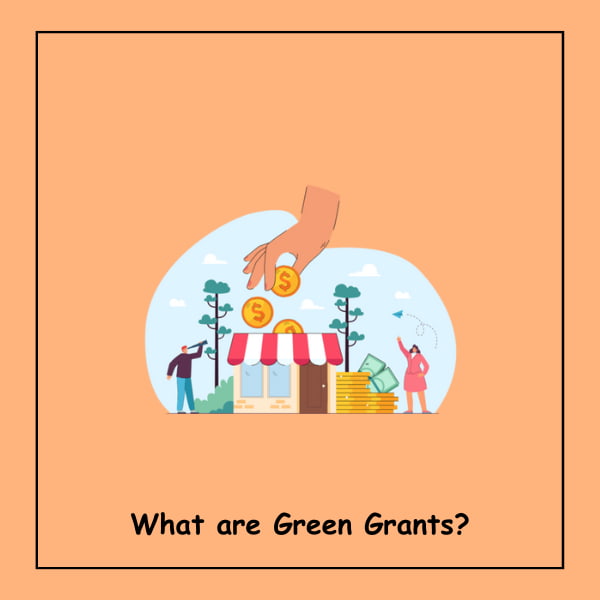
Green grants, also referred to as environmental grants or eco-grants, represent crucial financial resources provided by a variety of entities, including government agencies, non-profit organizations, foundations, and corporations.
These grants serve as essential tools to support projects and initiatives aimed at advancing environmental sustainability and conservation efforts on local, regional, and global scales.
Covering a broad spectrum of activities, green grants encompass funding for initiatives such as the adoption of renewable energy sources, including solar, wind, hydro, and geothermal energy.
These initiatives are pivotal in reducing reliance on fossil fuels, mitigating climate change impacts, and facilitating the transition towards cleaner, more sustainable energy alternatives.
Moreover, green grants also support efforts to enhance energy efficiency across various sectors, such as buildings, transportation, and industrial processes.
Funding for energy efficiency improvements may include projects focused on upgrading to energy-efficient appliances, implementing building retrofits for improved insulation, and optimizing manufacturing processes to minimize energy consumption and waste generation.
In addition to energy-related initiatives, green grants allocate resources towards waste reduction and recycling programs.
These projects aim to minimize waste generation, increase recycling rates, and promote sustainable waste management practices, thereby mitigating environmental pollution and conserving natural resources.
Conservation efforts are another key focus area for green grants, with funding allocated towards the preservation and restoration of natural habitats, protection of endangered species, and promotion of biodiversity.
These initiatives contribute to maintaining healthy ecosystems, safeguarding wildlife populations, and preserving critical ecosystem services essential for human well-being.
Furthermore, green grants support sustainable agriculture and land management practices, including initiatives aimed at promoting soil conservation, water management, and agroforestry.
These projects seek to improve soil health, conserve water resources, and foster resilient agricultural systems capable of adapting to environmental challenges such as climate change.
Additionally, environmental education and outreach programs receive funding through green grants to raise awareness about environmental issues, foster environmental literacy, and promote sustainable behavior change within communities.
These initiatives play a crucial role in empowering individuals and communities to take proactive steps toward environmental conservation and sustainability.
Overall, green grants play a pivotal role in driving positive environmental change by providing financial support for projects and initiatives that promote sustainability, resilience, and conservation.
Through strategic investments in environmentally responsible initiatives, green grants contribute to building a more sustainable future for present and future generations.
What are the Renewable Energy Efficiency Grants and Green Grants for Churches?
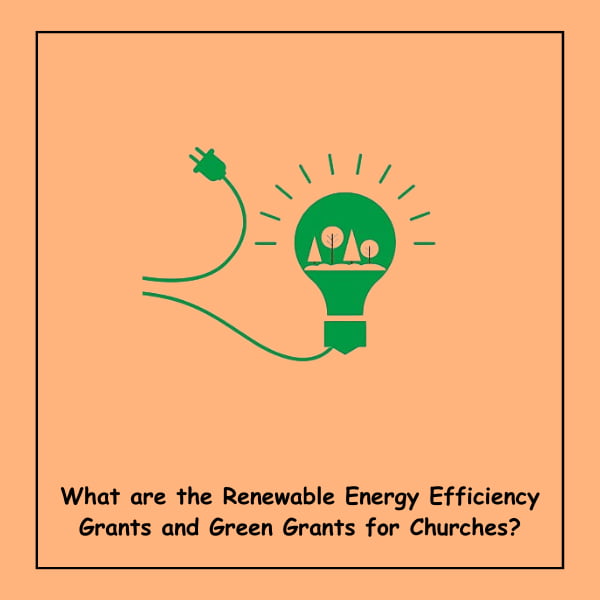
Renewable Energy Efficiency Grants and Green Grants for Churches encompass financial resources specifically tailored to assist religious institutions in implementing environmentally sustainable practices and technologies.
These grants are designed to facilitate the adoption of renewable energy sources and enhance energy efficiency within church facilities.
By providing funding support, these grants enable churches to reduce their carbon footprint, lower energy costs, and demonstrate a commitment to environmental stewardship.
Renewable Energy Efficiency Grants for Churches focus on initiatives aimed at harnessing renewable energy sources such as solar, wind, hydroelectric, and geothermal power.
These grants may cover the costs associated with the installation of solar panels, wind turbines, or other renewable energy systems on church properties.
By generating clean, renewable energy onsite, churches can reduce their reliance on fossil fuels and contribute to mitigating climate change.
Green Grants for Churches extend beyond renewable energy projects to encompass a broader range of environmental initiatives.
These grants support efforts to improve energy efficiency, implement sustainable building practices, and promote eco-friendly behaviors within church communities.
Funding may be allocated for energy audits, building retrofits, energy-efficient lighting upgrades, and insulation improvements to enhance energy efficiency and reduce operational costs.
In addition to energy-related projects, Green Grants for Churches may support initiatives such as waste reduction, recycling programs, water conservation efforts, and community education and outreach activities.
These grants empower churches to adopt holistic approaches to sustainability, addressing various aspects of environmental conservation and promoting sustainable living principles among congregants.
Overall, Renewable Energy Efficiency Grants and Green Grants for Churches play a vital role in enabling religious institutions to align their operations with principles of environmental stewardship and sustainability.
By leveraging these grants, churches can lead by example, inspire their communities to embrace eco-friendly practices and contribute to building a more sustainable future for all.
How to Get Energy Efficiency Green Grants for Churches

Securing energy efficiency green grants for churches involves following a structured process and meeting specific requirements. Here’s a step-by-step guide to help religious institutions navigate the process effectively:
- Research Available Grants: Begin by conducting thorough research to identify available energy-efficiency green grants tailored for churches. Explore various sources, including government agencies, non-profit organizations, foundations, and utility companies, to discover potential funding opportunities. Look for grants specifically designed to support energy efficiency initiatives in religious institutions.
- Understand Eligibility Criteria: Carefully review the eligibility criteria outlined by each grant provider. These criteria may include factors such as the church’s tax-exempt status, geographic location, size of congregation, alignment with the grant’s focus areas, and project feasibility. Ensure that your church meets all eligibility requirements before proceeding with the application process.
- Prepare Necessary Documentation: Gather all required documentation to support your grant application. This typically includes documents such as proof of tax-exempt status, organizational mission statements, project proposals outlining the planned energy efficiency initiatives, detailed budget estimates, and any additional supporting materials demonstrating the environmental impact of the proposed projects. Organize your documents systematically to streamline the application process.
- Develop a Comprehensive Grant Proposal: Craft a detailed grant proposal that effectively communicates the objectives, methodologies, expected outcomes, and budget breakdown of your energy efficiency initiatives. Clearly articulate how the proposed projects align with the grant’s priorities and contribute to environmental sustainability. Provide evidence to demonstrate the potential impact of your projects on reducing energy consumption, lowering carbon emissions, and promoting energy conservation within your church community.
- Submit Your Grant Application: Follow the application instructions provided by the grant-making entity and submit your grant application before the specified deadline. Double-check that all required documents are included and that the application is complete and error-free. Pay close attention to any specific formatting or submission requirements outlined in the application guidelines.
- Engage in Follow-Up Communication: Be prepared to engage in follow-up communication with the grant provider, if necessary. Monitor your email inbox and phone for any requests for additional information or clarification regarding your grant application. Respond promptly and professionally to any inquiries to demonstrate your church’s commitment and readiness to participate in the grant program.
- Await Funding Decision: After submitting your grant application, patiently await the funding decision from the grant-making entity. This process may take some time as grant applications undergo thorough review and evaluation. Stay informed about the status of your application by regularly checking for updates on the grant provider’s website or contacting their grant administrator if needed.
- Implement Approved Projects: If your grant application is successful and funding is awarded, proceed with implementing the approved energy efficiency projects according to the proposed timeline and budget. Adhere to any reporting requirements specified by the grant provider and keep detailed records of project activities, expenditures, and outcomes. Consider engaging volunteers or hiring contractors with relevant expertise to ensure the successful execution of the projects.
By following these steps and diligently adhering to the requirements outlined by grant providers, churches can increase their chances of securing energy-efficiency green grants to support their efforts toward environmental sustainability and energy conservation.
Eligibility Criteria for Energy Efficiency Green Grants for Churches
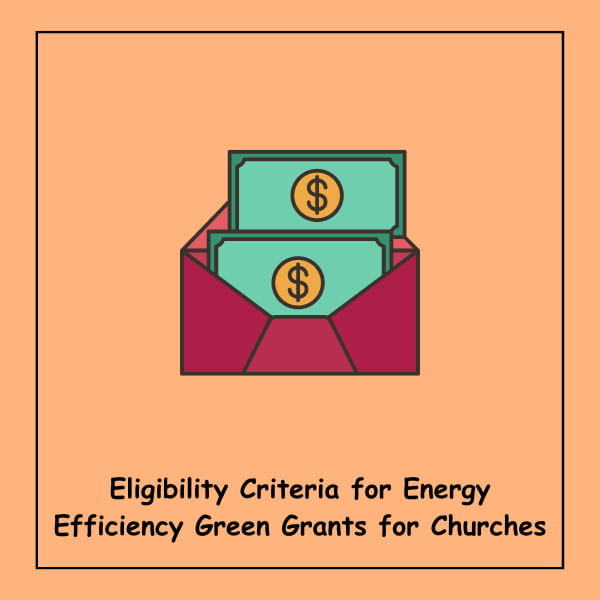
- Non-Profit Status Verification: Before applying for energy efficiency green grants, churches must ensure they possess official non-profit status. This typically requires documentation such as a 501(c)(3) determination letter from the IRS or equivalent documentation from relevant state authorities.
- Alignment with Grant Focus Areas: Churches should verify that their proposed projects align with the focus areas of the grant program. This alignment may encompass initiatives related to renewable energy adoption, energy efficiency improvements, waste reduction, or sustainability education within the church community.
- Geographic Considerations: Some grant programs may have geographic restrictions, limiting eligibility to churches located within specific regions or communities. It’s crucial for churches to confirm whether their location falls within the geographic boundaries specified by the grant provider.
- Feasibility Assessment: Grant applicants must demonstrate the feasibility of their proposed energy efficiency projects. This entails presenting clear objectives, strategies, timelines, and budget estimates that showcase the practicality and potential success of the initiatives.
- Community Impact Evaluation: Grant programs may prioritize projects with a significant positive impact on the local community or environment. Churches should articulate how their proposed projects will benefit the community, such as through energy cost savings, environmental improvements, or community engagement opportunities.
- Capacity Assessment: Grant providers may assess the church’s capacity to manage funds and execute proposed projects effectively. This evaluation may consider factors such as the church’s financial stability, organizational structure, past project management experience, and available resources.
- Commitment to Sustainability: Churches should demonstrate a genuine commitment to environmental stewardship and sustainability. This can be evidenced through existing sustainability initiatives, the incorporation of sustainability principles into the church’s mission and values, and the active engagement of congregants in environmental activities.
Document Requirements for Energy Efficiency Green Grants for Churches
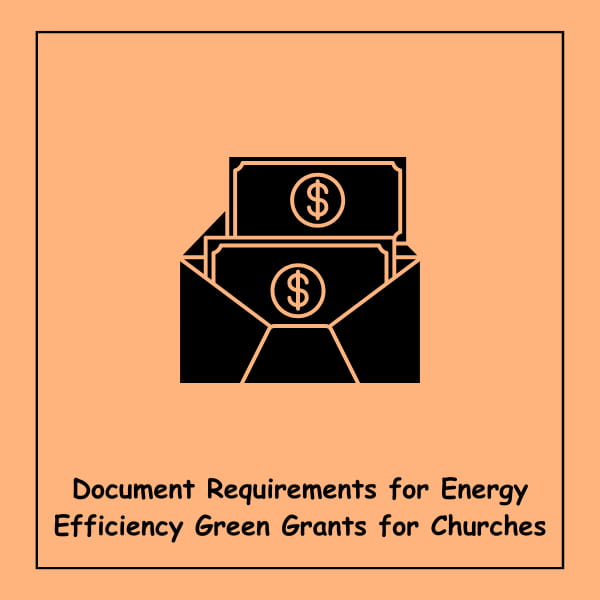
- Non-Profit Status Documentation: Churches must provide official documentation proving their non-profit status, such as a copy of their IRS 501(c)(3) determination letter or equivalent certification from state authorities.
- Comprehensive Project Proposal: A detailed project proposal outlining the objectives, methodologies, anticipated outcomes, timelines, and budget estimates for the proposed energy efficiency initiatives is essential for grant applications.
- Budget Breakdown: Churches must provide a comprehensive breakdown of the project budget, including itemized lists of expenses such as equipment costs, labor fees, installation costs, permits, and any other relevant expenditures.
- Supporting Materials: Additional supporting materials may be required to demonstrate the environmental impact and feasibility of the proposed projects. This could include energy audit reports, feasibility studies, technical specifications for equipment, and letters of support from community stakeholders.
- Organizational Information: Churches may need to submit general organizational information, including their mission statement, history, leadership structure, and contact details.
- Legal Documentation: Any legal documentation related to the church’s ownership or lease of the property where the energy efficiency projects will be implemented may also be required.
- Financial Statements: Recent financial statements may be requested to demonstrate the church’s financial stability and capacity to manage grant funds effectively.
Application Process for Energy Efficiency Green Grants for Churches
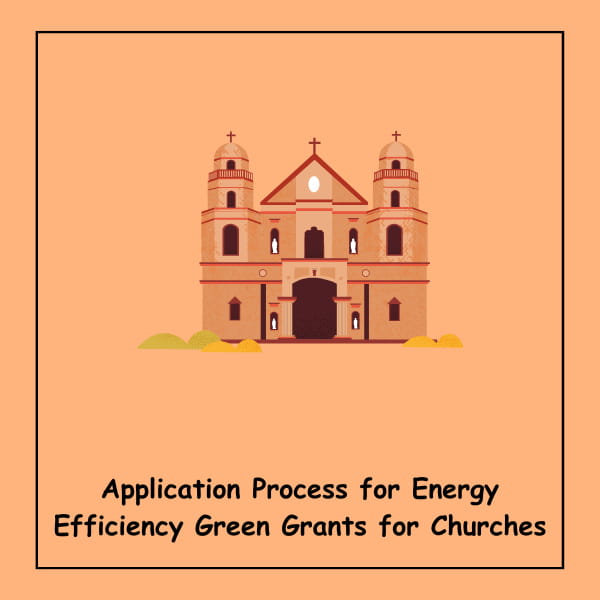
- Thorough Research: Begin by conducting comprehensive research to identify available energy-efficiency green grants for churches from various sources, including government agencies, non-profit organizations, foundations, and utility companies.
- Review Eligibility Criteria: Carefully review and understand the eligibility criteria specified by each grant provider to ensure that your church meets all requirements before proceeding with the application process.
- Document Preparation: Gather all necessary documents and ensure they are organized and prepared according to the requirements outlined by the grant provider. This may involve collaborating with church leadership and relevant stakeholders to compile the required information.
- Complete Application Form: Fill out the grant application form provided by the grant-making entity, ensuring all required fields are completed accurately, and all supporting documents are attached as per the application guidelines.
- Submission: Submit the completed grant application and supporting documents within the specified deadline and according to the submission instructions provided by the grant provider. Double-check that all requirements have been met to avoid any delays or complications.
- Engage in Communication: Be prepared to engage in follow-up communication with the grant provider, if necessary. Respond promptly to any requests for additional information or clarification regarding your application to ensure a smooth review process.
- Await Funding Decision: After submitting your application, patiently await the funding decision from the grant provider. Stay informed about the status of your application by regularly checking for updates or communications from the grant provider.
- Project Implementation: If your grant application is successful and funding is awarded, proceed with implementing the approved energy efficiency projects according to the proposed timeline and budget. Keep detailed records of project activities, expenditures, and outcomes for reporting and accountability purposes.
Types of Energy Efficiency Green Grants Offered to Churches
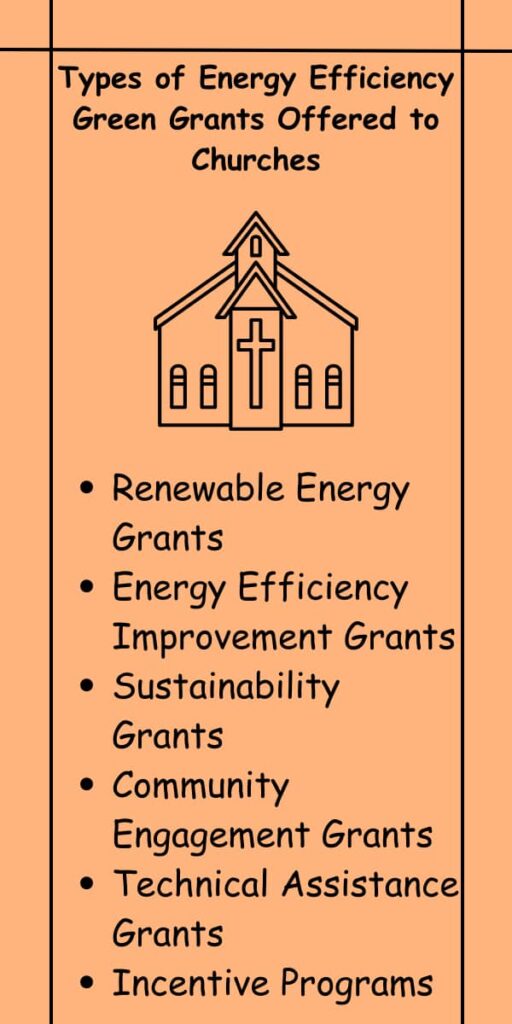
When it comes to supporting energy efficiency initiatives in churches, various types of green grants are available to provide financial assistance. These grants cater to different aspects of energy efficiency and sustainability within religious institutions:
- Renewable Energy Grants: One type of grant focuses on supporting the adoption of renewable energy solutions in churches. These grants may cover the costs associated with installing solar panels, wind turbines, or other renewable energy systems on church properties. By generating clean, renewable energy onsite, churches can reduce their reliance on fossil fuels and lower their carbon footprint.
- Energy Efficiency Improvement Grants: Another category of grants is dedicated to funding initiatives aimed at improving energy efficiency in church facilities. These grants may support projects such as upgrading to energy-efficient lighting systems, installing programmable thermostats, or implementing building insulation and weatherization measures to reduce energy consumption and lower utility bills.
- Sustainability Grants: Some grants focus on promoting overall sustainability practices within churches. These grants may support projects that go beyond energy efficiency to include initiatives such as waste reduction, recycling programs, water conservation efforts, and sustainable landscaping projects. By adopting holistic sustainability practices, churches can minimize their environmental impact and promote stewardship of natural resources.
- Community Engagement Grants: Certain grants emphasize the importance of community engagement in promoting energy efficiency and sustainability. These grants may fund projects that involve educating congregants and the wider community about energy conservation, organizing workshops or events on sustainable living practices, or fostering partnerships with local organizations to implement environmental initiatives.
- Technical Assistance Grants: Some grant programs offer technical assistance to help churches assess their energy usage, identify opportunities for efficiency improvements, and develop comprehensive energy management plans. These grants may provide funding for energy audits, feasibility studies, or hiring energy consultants to support churches in implementing cost-effective energy-saving measures.
- Incentive Programs: Additionally, there are incentive programs and rebates offered by utility companies or government agencies to encourage churches to invest in energy efficiency upgrades. These programs may provide financial incentives or discounts for installing energy-efficient equipment, upgrading HVAC systems, or participating in demand response programs to reduce electricity consumption during peak hours.
By offering a diverse range of energy efficiency green grants, organizations aim to support churches in their efforts to reduce energy consumption, lower operating costs, and contribute to a more sustainable future.
Each type of grant targets specific aspects of energy efficiency and sustainability, providing churches with opportunities to tailor their initiatives to meet their unique needs and goals.
List of Organizations that Offer Energy Efficiency Green Grants for Churches
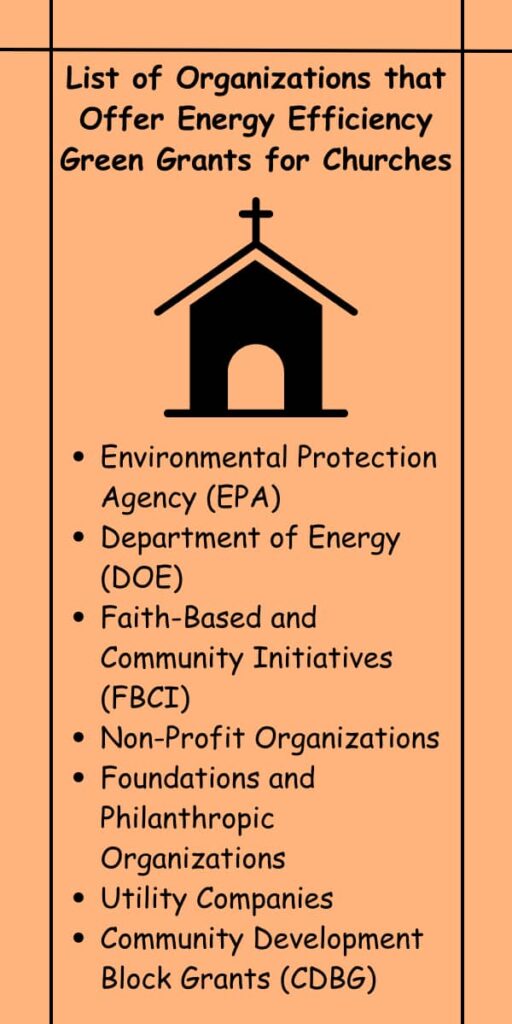
- Environmental Protection Agency (EPA): The Environmental Protection Agency offers various grant programs aimed at promoting energy efficiency and environmental sustainability, including initiatives tailored for churches and other religious institutions. These grants may support projects such as energy audits, energy efficiency upgrades, renewable energy installations, and community outreach efforts.
- Department of Energy (DOE): The Department of Energy administers several grant programs focused on advancing energy efficiency and renewable energy adoption. These programs provide funding opportunities for churches to implement energy-saving measures, adopt renewable energy technologies, and participate in energy conservation initiatives.
- Faith-Based and Community Initiatives (FBCI): The Faith-Based and Community Initiatives program within various government agencies may offer grant opportunities specifically targeted at religious organizations, including churches. These grants may support a wide range of initiatives, including energy efficiency upgrades, sustainability projects, and community engagement efforts.
- Non-Profit Organizations: Several non-profit organizations dedicated to environmental conservation and sustainability offer grant programs designed to support energy efficiency initiatives in churches. These organizations may focus on specific regions or communities and provide funding for projects such as energy audits, energy-efficient equipment upgrades, and renewable energy installations.
- Foundations and Philanthropic Organizations: Foundations and philanthropic organizations committed to environmental stewardship and social responsibility may offer grants to support energy efficiency projects in churches. These grants may be part of broader funding initiatives aimed at promoting sustainability, addressing climate change, or enhancing community resilience.
- Utility Companies: Many utility companies offer incentive programs and rebates to encourage churches to invest in energy efficiency upgrades. These programs may provide financial incentives for installing energy-efficient lighting, HVAC systems, and insulation, or participating in demand response programs to reduce electricity consumption during peak hours.
- Community Development Block Grants (CDBG): Community Development Block Grants administered by local governments may include funding opportunities for churches to undertake energy efficiency projects. These grants aim to support community development initiatives, including improvements to public facilities such as churches, schools, and community centers.
Conclusion:
In conclusion, numerous organizations and entities offer energy efficiency green grants specifically tailored to support churches and religious institutions in their efforts to promote environmental sustainability and reduce energy consumption.
From government agencies such as the Environmental Protection Agency and the Department of Energy to non-profit organizations, foundations, and utility companies, there are diverse funding opportunities available for churches to implement energy-saving measures, adopt renewable energy technologies, and engage their communities in environmental stewardship.
By leveraging these grants, churches can play a significant role in contributing to a more sustainable future while demonstrating their commitment to caring for the planet and their congregations.
[the_ad id=”39205″]
Frequently Asked Questions (FAQ):
What Are Renewable Energy Efficiency Grants for Churches?
Renewable energy efficiency grants for churches are financial resources specifically tailored to assist religious institutions in implementing environmentally sustainable practices and technologies. These grants support initiatives such as solar panel installations, energy-efficient lighting upgrades, and insulation improvements to reduce energy consumption and lower carbon emissions.
Who Provides Green Grants for Churches?
Green grants for churches are offered by various entities, including government agencies, non-profit organizations, foundations, utility companies, and philanthropic organizations. These grants aim to promote energy efficiency, renewable energy adoption, and environmental stewardship within religious communities.
What Types of Projects Do Green Grants for Churches Typically Support?
Green grants for churches support a wide range of projects, including renewable energy installations (e.g., solar panels, wind
turbines), energy efficiency upgrades (e.g., lighting retrofits, HVAC system improvements), waste reduction programs, water conservation initiatives, sustainable landscaping projects, and community education and outreach activities related to environmental sustainability.
How Can Churches Apply for Energy Efficiency Green Grants?
To apply for energy efficiency green grants, churches should conduct thorough research to identify available grant opportunities, review eligibility criteria, gather necessary documentation (e.g., proof of non-profit status, project proposals, budget estimates), complete the application form, and submit the application along with supporting materials to the grant-making entity within the specified deadline.
What Are the Benefits of Securing Green Grants for Churches?
Securing green grants enables churches to reduce their carbon footprint, lower energy costs, demonstrate environmental stewardship, engage their congregations in sustainability initiatives, improve community outreach and collaboration, enhance their reputation as environmentally responsible institutions, and contribute to building a more sustainable future for all.
Are There Specific Requirements for Churches to Be Eligible for Green Grants?
Yes, churches typically need to demonstrate their non-profit status, align their proposed projects with the grant’s focus areas (e.g., renewable energy adoption, energy efficiency improvements), show the feasibility and community impact of their projects, provide organizational information, and exhibit a genuine commitment to sustainability and environmental stewardship.
What Types of Documentation Are Required for Energy Efficiency Green Grant Applications?
Documentation requirements may include proof of non-profit status (e.g., IRS 501(c)(3) determination letter), comprehensive project proposals, budget breakdowns, supporting materials demonstrating the environmental impact and feasibility of proposed projects, organizational information (e.g., mission statement, leadership structure), legal documentation related to property ownership or lease, and financial statements.
How Long Does It Typically Take to Receive a Funding Decision for Green Grant Applications?
The timeline for receiving a funding decision varies depending on the grant provider and the specific grant program. It may take several weeks to months for applications to undergo review, evaluation, and selection processes. Churches should stay informed about the status of their applications by regularly checking for updates from the grant provider.
Can Churches Receive Multiple Green Grants for Different Projects?
Yes, churches may receive multiple green grants for different projects as long as they meet the eligibility criteria and align their proposed projects with the respective grant programs’ focus areas. It’s essential to carefully review each grant’s requirements and submit separate applications for distinct projects.
What Resources Are Available to Help Churches Navigate the Green Grant Application Process?
Various resources, including online guides, workshops, webinars, and consulting services, are available to help churches navigate the green grant application process. Additionally, reaching out to grant administrators, collaborating with environmental organizations, and networking with other churches that have successfully obtained green grants can provide valuable insights and support.




